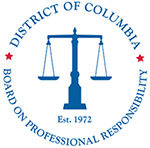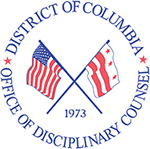- For the Public
- For Lawyers
- Board on Professional Responsibility
- Office of Disciplinary Counsel
- Disciplinary Decisions
-
Attorney Discipline News
- Administrative Order 2020-8: Live Streams of Hearing Committee Proceedings
- Administrative Order 2023-1: Return to In-Person Proceedings
- The Court of Appeals Makes Appointments to the Board on Professional Responsibility
- Amendments to the Rules of the Board on Professional Responsibility
- Amendments to the Rules of the Board on Professional Responsibility
- Volunteer Opportunities
From Washington Lawyer, February 2014
By Joe Perry and Azadeh Matinpour
Lawyers have for centuries emphasized that the promotion of justice, rather than the earning of fees, is the goal of the profession.”[1]
On December 1, 2013, a Metro-North train headed for Manhattan derailed at “Spitting Devil’s” curve in the Bronx, killing four and injuring dozens. By the following day, local personal injury firms had published statements online touting their credentials, suggesting negligence on the part of Metro-North, and emphasizing their firms’ readiness to assist.
Such advertising, by itself, does not appear to run afoul of New York ethics rules barring in-person, telephone, or interactive computer solicitation.[2] It also likely would pass muster under the D.C. Rules of Professional Conduct governing attorney communications, which do not, generally, bar in-person solicitations provided they are not false or misleading.[3] However, statutory law and another jurisdiction’s rules may have a longer reach. In a 2009 column, Bar Counsel discussed how federal law governing rail accidents might bar seemingly permissible solicitation, and choice of law rules might dictate that a foreign jurisdiction’s professional conduct rules apply.[4]
Since that time, the D.C. Court of Appeals has addressed the solicitation issue directly in the context of motor vehicle accidents. In re Bergman addressed a challenge to the descriptively named White Collar Insurance Fraud Prosecution Enhancement Amendment Act of 2006.[5] Generally, the law prohibits the in-person solicitation of a motor vehicle accident victim within 21 days of an accident, outside of circumstances where the attorney and potential client have a pre-existing business relationship.[6] After its enactment, a D.C. Bar member brought suit, claiming that the law violated the First Amendment as well as the Home Rule Act. The court rejected these contentions, basing its decision in large part on members of the Bar and accident victims who spoke before the D.C. Council about the invasive nature of solicitations following an accident. The court found that even if no “overly aggressive” tactics were used, the sheer volume of solicitations could be disturbing at a time when many of the recipients are “likely to be in physical or emotional distress or in vulnerable circumstances.”[7] As such, the District had a substantial interest in regulating the practice, and given that the in-person solicitation bar is limited to 21 days, and that mail solicitations are permitted from the outset, the law is sufficiently tailored to pass constitutional scrutiny.[8] Further, the court insisted that the case was “not about the benign democratic ideal of opposing views competing for public acceptance. Rather, it is about practitioners aggressively seeking to secure potentially profitable business.”[9]
There is nothing shameful in an attorney working hard for his or her fee, and the prospect of a paycheck certainly may serve as a substantial motivation to do the best possible job for a client. The danger, particularly at the solicitation stage, is that the desire for profit may not align with a (potential) client’s interest—those rendered vulnerable by a recently experienced accident may make a decision about hiring counsel or bringing suit that they would not otherwise make. Whatever the D.C. rules might permit, statutory regulation of in-person advertising goes further, not only protecting victims from harassment, but serving to remind lawyers in an extremely competitive corner of the profession that the client is in charge from day one.
Joe Perry and Azadeh Matinpour serve as assistant bar counsel and investigative attorney, respectively, in the Office of Bar Counsel.
Notes
[1] Ohralik v. Ohio State Bar Association, 436 U.S. 447, 460 (98 S.Ct. 1912).
[2] Longstreth, Andrew, Despite Ethics Ban, Lawyers Find Ways to Reach N.Y. Train Accident Victims, Reuters, http://reut.rs/IGIs7p (last visited Dec. 12, 2013).
[3] See Rules 7.1 (Communications Concerning a Lawyer’s Services); 7.5 (Firm Names and Letterheads).
[4] Gene Shipp and Joe Perry, Tragedy and the Attorney Solicitation Debate, Wash. Law., Oct. 2009 at 10.
[5] 986 A.2d 1208 (D.C. 2010).
[6] Solicitations by mail are permitted immediately after the accident, however, making the D.C. statute less restrictive than the Florida regulation upheld by the U.S. Supreme Court in Florida Bar v. Went For It, Inc., 515 U.S. 618 (1995) (upholding Florida Bar prohibitions on targeted, direct mail solicitations to accident and disaster victims within 30 days of injury).
[7] Bergman, 986 A.2d at 1214, 1218.
[8] As the advertising the law sought to regulate constituted commercial speech, the law warranted only intermediate scrutiny. Bergman, 986 A.2d at 1216–17.
[9] Id. at 1216.
Disciplinary Actions Taken by the Board on Professional Responsibility
Original Matters
IN RE THOMAS FORTUNE FAY. Bar No. 23929. November 27, 2013. The Board on Professional Responsibility directs Bar Counsel to informally admonish Fay. The Board upheld the Hearing Committee’s finding of the existence of an attorney–client relationship where Fay was engaged by a suspended lawyer to file a civil complaint on behalf of the suspended lawyer’s client. After filing the complaint, Fay, as the counsel of record, failed to provide his client with skill and care commensurate with that generally afforded clients by other lawyers in similar matters; failed to represent the client zealously and diligently, including failing to attend to the client’s case with reasonable promptness; failed to keep the client reasonably informed about the status of the case; failed to explain the status of the client’s case to permit client to make informed decisions regarding the representation; and failed to provide the client with a writing setting forth the basis of rate or fee, as proscribed by the Rule in place in 1999. Rules 1.1(b), 1.3(a), 1.3(c), 1.4(a), 1.4(b), and 1.5(b).
IN RE DARYL J. HUDSON III. Bar No. 292045. November 8, 2013. The Board on Professional Responsibility recommends that the D.C. Court of Appeals disbar Hudson. Hudson was convicted in the U.S. District Court for the District of New Mexico of seven counts of wire fraud, in violation of 18 U.S.C. § 1343, crimes involving moral turpitude per se for which disbarment is mandatory under D.C. Code § 11-2503(a) (2001).
Disciplinary Actions Taken by the District of Columbia Court of Appeals
Original Matters
IN RE WARREN E. BROWN. Bar No. 405274. November 27, 2013. The D.C. Court of Appeals granted Brown’s petition for reinstatement.
IN RE SCOTT B. GILLY. Bar No. 442356. November 7, 2013. In a reciprocal matter from the U.S. District Court for the Southern District of New York, the D.C. Court of Appeals imposed identical reciprocal discipline and suspended Gilly for one year with fitness, nunc pro tunc to September 25, 2013. Gilly was found to have violated ethical rules relating to knowing use of false evidence, suppression of evidence, failure to disclose information he had a legal obligation to disclose, false statement to a third person, failure to supervise a subordinate lawyer, and dishonesty.
IN RE MATTHEW KLUGER. Bar No. 981786. November 21, 2013. The D.C. Court of Appeals disbarred Kluger. Kluger was convicted in the U.S. District Court for the District of New Jersey of obstruction of justice, in violation of 18 U.S.C. § 1512(c)(2); conspiracy to commit securities fraud, in violation of 18 U.S.C. § 371; securities fraud, in violation of 15 U.S.C. §§ 78j(b) and 78ff(a); and conspiracy to commit money laundering, in violation of 18 U.S.C. § 1956(h). Kluger’s conviction for obstruction of justice is a crime involving moral turpitude per se for which disbarment is mandatory under D.C. Code § 11-2503(a) (2001).
Interim Suspensions Issued by the District of Columbia Court of Appeals
IN RE SHERON A. BARTON. Bar No. 997851. November 21, 2013. Barton was suspended on an interim basis based upon discipline imposed by the U.S. District Court for the District of Maryland.
IN RE MIRA S. BURGHARDT. Bar No. 484157. November 21, 2013. Burghardt was suspended on an interim basis based upon discipline imposed in Massachusetts.
IN RE CHARLES P. INGENITO. Bar No. 450710. November 21, 2013. Ingenito was suspended on an interim basis based upon discipline imposed in New Jersey.
IN RE LILY MAZAHERY. Bar No. 480044. November 21, 2013. Mazahery was suspended on an interim basis pursuant to D.C. Bar R. XI, § 9(g), pending final action on the Board on Professional Responsibility’s October 4, 2013, recommendation of disbarment.
IN RE JAMES MEANEY III. Bar No. 352872. November 21, 2013. Meaney was suspended on an interim basis based upon discipline imposed in Tennessee.
IN RE JOSEPH J. O’HARA. Bar No. 362581. November 21, 2013. O’Hara was suspended on an interim basis based upon his conviction of a serious crime in the U.S. District Court for the Western District of Texas.
IN RE WADE A. ROBERTSON. Bar No. 495427. November 21, 2013. Robertson was suspended on an interim basis based upon the California State Bar Court’s involuntary transfer of his license to inactive status while the Supreme Court of California reviews the recommendation that Robertson be disbarred.
Disciplinary Actions Taken by Other Jurisdictions
In accordance with D.C. Bar Rule XI, § 11(c), the D.C. Court of Appeals has ordered public notice of the following nonsuspensory and nonprobationary disciplinary sanctions imposed on D.C. attorneys by other jurisdictions. To obtain copies of these decisions, visit www.dcattorneydiscipline.org and search by individual names.
IN RE ROBERT N. LEVIN. Bar No. 79137. On July 2, 2013, the Court of Appeals of Maryland reprimanded Levin for violations of Maryland Rules 1.15(e), 3.4(c), and 8.4(d) for disregarding a Writ of Garnishment.
IN RE MICHAEL W. LU. Bar No. 452071. On July 18, 2013, the Court of Appeals of Maryland reprimanded Lu by consent based upon Lu’s admission that he violated Maryland Rule 1.3 by not diligently assuring that he and his client had a complete understanding of one of the grounds for annulment of marriage in Virginia when translating from English to Chinese.
Informal Admonitions Issued by the Office of Bar Counsel
IN RE LAURA HEISER. Bar No. 411822. November 8, 2013. Bar Counsel issued Heiser an informal admonition. While practicing law as a U.S. Department of Justice attorney, Heiser failed to maintain an active license, engaged in conduct that seriously interferes with the administration of justice, and engaged in conduct involving dishonesty, fraud, deceit, or misrepresentation. Rules 5.5(a), 8.4(c), and 8.4(d).
The Office of Bar Counsel compiled the foregoing summaries of disciplinary actions.
Informal Admonitions issued by Bar Counsel and Reports and Recommendations
issued by the Board on Professional Responsibility are posted at
www.dcattorneydiscipline.org. Most board recommendations as to discipline are
not final until considered by the court. Court opinions are printed in the Atlantic Reporter and also are available online for decisions issued since August 1998. To obtain
a copy of a recent slip opinion, visit www.dccourts.gov/internet/opinionlocator.jsf.
- For the Public
- For Lawyers
- Board on Professional Responsibility
- Office of Disciplinary Counsel
- Disciplinary Decisions
-
Attorney Discipline News
- Administrative Order 2020-8: Live Streams of Hearing Committee Proceedings
- Administrative Order 2023-1: Return to In-Person Proceedings
- The Court of Appeals Makes Appointments to the Board on Professional Responsibility
- Amendments to the Rules of the Board on Professional Responsibility
- Amendments to the Rules of the Board on Professional Responsibility
- Volunteer Opportunities

- Board on Professional Responsibility
- 430 E Street NW
- Suite 138
- Washington, DC 20001
- Phone: 202-638-4290
- Fax:

- Office of Disciplinary Counsel
- District of Columbia Court of Appeals
- 515 5th Street, NW
- Building A, Suite 117, Washington, DC 20001
- Phone: 202-638-1501
- Fax: 202-638-0862

